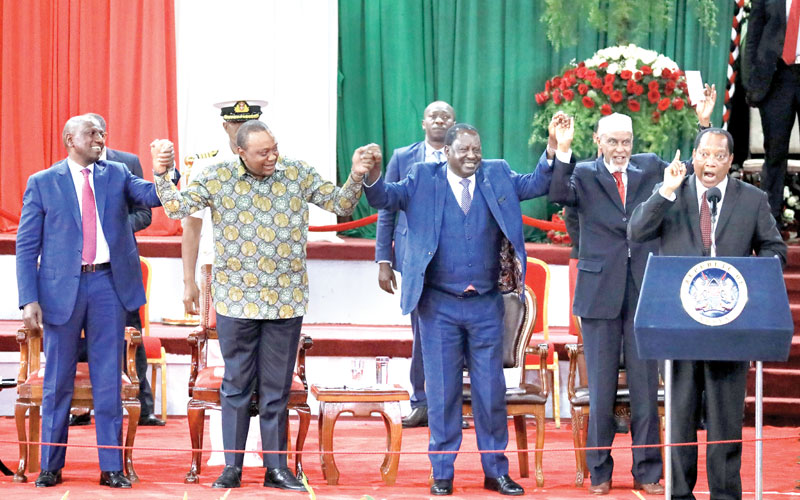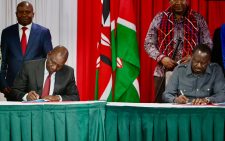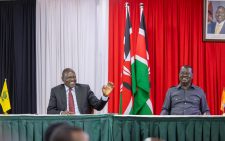Litmus test for BBI as demands stream in

By People Daily Team and KNA
It’s the moment of truth for the Building Bridges Initiative (BBI) as communities across the country table emotive issues they want addressed as the unity campaign enters the homestretch in seeking a consensus document.
This weekend, the BBI team came face to face with some of the issues that have presented a litmus test to the country’s cohesion. For example, the BBI rally in Narok town on Saturday opened the lid over the country’s simmering ethnic tensions, touching on land, sharing of resources and representation.
And yesterday, as Opposition chief Raila Odinga led the latest rally in Garissa county, Deputy President William Ruto was accusing the BBI rallies organisers of using the platforms to pit communities against each other.
The DP was reacting to comments by Narok Senator Ledama ole Kina which appeared to suggest that non-Maasai communities were unwelcome in counties dominated by the former, opening himself to condemnation from members of the Kalenjin community.
Tsunami bravado
The DP charged that the rallies were being used to preach animosity against the very spirit of the campaign which is to cultivate national cohesion.
“If the kind of reggae and tsunami they are talking about is that of profiling ethnicity and hatred among the communities, we will stop it,” said the DP, alluding to the BBI team’s comparison of the drive to a powerful tsunami that will clear everything on its way.
“We reject the tsunami bravado and hubris and threats by those pushing for a divisive winners versus losers debate on the BBI,” he said in Manyatta constituency, Embu county.
The Mount Kenya region is expected to add its voice to the raging debate as politicians and professional groups meet in Nairobi today to flesh issues that will be presented during the next BBI rally in Meru on Saturday. (See story on page 2)
High expectations have been placed on the initiative arising from the March 2018 Handshake between President Uhuru Kenyatta and Raila, with communities outlining their grievances for consideration in the anticipated BBI recommendations.
The emerging sticky issues include land rights, the formula for sharing of resources, representation, historical injustices, motivation for an expanded executive, and creation of regional governments.
The other is the issue of representation by marginalised groups: The one-man, one-vote mantra, versus one-kilometre, one-vote.
Education crisis
In Garissa yesterday, Raila was forced to wade into the controversial withdrawal of teachers from the region over security concerns. The education crisis occasioned by the transfer of non-local teachers dominated the rally held at Garissa Primary School, with local leaders calling for an overhaul of the Teachers Service Commission (TSC) by Education ministry.
“I will be meeting with President Uhuru Kenyatta next week to find an acceptable solution to the crisis,” Raila assured during the rally that was boycotted by Ruto’s allies, notably National Assembly Majority Leader Aden Duale, who is the area MP.
Leaders from the region have bitterly accused the teachers’ employer of unilaterally removing the tutors “in haste and without consultation”. The issue has become so emotive, with some leaders suggesting that in future non-local teachers should not be listed for interviews, accusing them of using the region to get employment only to abandon them midway.
Raila affirmed that a proposal for affirmative action to have D+ and C- KCSE grades declared entry points for locals willing to join primary and secondary teaching colleges, respectively, will be considered.
Nominated MP and Kenya National Union of Teachers (Knut) secretary general Wilson Sossion said the northeastern education crisis will only be solved through affirmative action, accusing TSC of having frustrated the plan.
“We cannot be talking of quality when there is no access to education. Children who were trained under affirmative action must be redeployed to solve the education problem in the region,” he said.
And even as the Ruto camp sustained its onslaught against the BBI campaign, Raila maintained the process will continue.
“BBI is unstoppable. We came together with the President to address unemployment, insecurity, tribalism, corruption and electoral fraud,” he said in the company of Garissa Senator Yusuf Haji, who chairs the committee spearheading the BBI process.
“We decided to come together and see where our problem started so that we bring solutions to what is ailing our country,” said Raila.
Leaders from northeastern region rooted for a pure parliamentary system and establishment of a powerful prime minister post, saying it would end electoral chaos witnessed in past elections.
Creating confusion
Former National Assembly Deputy Speaker Farah Maalim said the region should not be left behind in the BBI discourse.
“We now have a chance to have our voice heard,” he said, adding that countries with parliamentary system of government had high level of stability and tranquility.
In Embu, Ruto declared that every Kenyan had a right to live in any part of the country without seeking permission from any person.
Speaking at Gatunduri Full Gospel Church in Manyatta, the DP said BBI should not be used as populist idea for creating confusion and hatred.
“There are those who are obsessed with the BBI tsunami, I want to ask you to ignore all those people because they want to divide Kenyans so that we have winners, losers and survivors; that will not happen,” he said.
Gatundu South MP Moses Kuria urged the President to be cautious with Raila because of the remarks made in Narok on Saturday in the latter’s presence.
“Raila and his allies in ODM are fuelling negative ethnicity,” he said.
Kiharu MP Ndindi Nyoro claimed leaders allied to the DP were being blackmailed, but vowed to remain steadfast in support for Ruto.
At the same time, Duale warned that BBI rallies were causing confusion and were being used as platforms for ethnic profiling.
In the recommendations read out by Mandera Governor Ali Roba, northeastern residents want a County Policing Authority established and managed by counties. Each county to establish its own county police service. They also want the Government to invest in counter-radicalisation measures in the national government and enhance cooperation between the two levels of government in counter terrorism measures.
The County Action Plan, according to the residents, should be directly funded by the national government for all the Northern counties so at to protect the nation against terror and radicalisation.
On land, residents recommended that the government should register all community land. They are also want any prospecting and exploitation of resources on any community or public land be carried out cooperation with county governments and communities that have customary ownership of the land.












